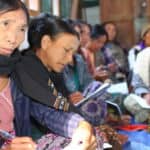Beyond the Bottom Line: How Changing the Supplier-Distributor Dynamic Creates Better Products for People Living in Poverty
Too often supplier and distributor relationships are purely transactional, one-way and unresponsive. However, what customers living in poverty need is to be served by true partnerships that continually focus on the end user.
This is the reality we’re creating between Greenlight Planet and Pollinate Group. Over the past five years we’ve embraced transparency, made exceptions, failed and grown together.
Greenlight Planet makes and delivers affordable energy to the world’s two billion under-electrified consumers, including the Sun King range of solar products. Pollinate Group is a social enterprise empowering women as leaders of change, equipping them to distribute products to their peers that improve health, and save time and money in neglected communities across India and Nepal.
By sharing a bit about how we work together and trial new products, we hope other suppliers and distributors will be inspired to challenge traditional approaches, and accelerate the progress toward SDG7, which aims to “ensure access to affordable, reliable, sustainable and modern energy for all.”
Mutualism and evolving together
To make an analogy with nature, as organisations we’re different species, but we rely on each other to thrive. Without Greenlight Planet, Pollinate Group would not have access to a growing range of solar-powered products for people living on less than $1.90 a day. Without Pollinate Group, Greenlight Planet could not serve the communities that many deem too risky, transient and hard to reach.
Our size and business models are not the same. But we’ve evolved together, embraced product diversification and responded to market changes to introduce more than 10 new products together, including solar televisions and solar torches.
The journey has been made easier by recognising similarities in our organisational cultures. For instance, we both have a strong purpose, we are both learning organisations, and we both desire to build meaningful relationships with our customers. We also both value training: For example, Greenlight Planet helps up-skill Pollinate Group’s women entrepreneurs and sales agents, increasing sales effectiveness and timely customer service for warranties. It’s a boon for both brands, which is supported by co-branding activities to increase marketing efficiency.
Identifying similarities means we understand each other’s pressure points and broader challenges. We can have more open conversations to make quick decisions. We avoid bureaucracy when trialing new products, and we quickly share any opportunity we believe could benefit our markets, teams or stakeholders.
Pollinate Group has definitely advanced from exposure to Greenlight Planet’s global operations, for instance, by learning from its Easy Buy payment plans in Africa and customizing them to an Indian context. As a result, Pollinate Group is the largest distributor of Greenlight’s pay-as-you-go products in India.
Greenlight Planet has also learned from Pollinate Group’s focus and expertise in training and developing women entrepreneurs. Pollinate Group’s scalable success in this model has encouraged Greenlight Planet to rethink its own employment strategy in the field in India.
Our partnership also extends to realizing more diverse funding opportunities. Currently our two organisations are involved in a project with the Australian Department of Foreign Affairs (DFAT), who are funding Pollinate Group to scale its sales model, access new markets for clean energy products, empower women and create more meaningful private sector partnerships.
Product development must be inclusive and cannot be done in isolation
Both our companies highly value direct and honest feedback from customers. We want to understand what customers believe a product can do for them and how they would use it day to day. We identify the communities which we have the biggest potential to impact, and which present the best opportunities for selling.
When introducing a new Greenlight Planet product, Pollinate Group delivers training on how it works, and gathers information such as user details and product run time. It is also critical to understand how the product improves health and sanitation, saves time or money, provides a livelihood opportunity, and/or delivers environmental benefits.
Led by Pollinate Group, the customer feedback loop is efficient, using processes like a feedback matrix, with initial feedback collected within 7-10 days. This process is ongoing, and informs both organisations’ longer-term decisions. Pollinate Group does not sugarcoat feedback to Greenlight Planet—it provides honest input from the communities.
The strengths of a collaborative partnership and the transparency it affords can most strongly be seen at this stage. This cycle is as fast as it would be if Greenlight Planet sought customer feedback through our own customer feedback process. Customer feedback on the quality and utility of the products is then analysed to assess the readiness of the product for launch. Once products are deemed fit for market, our companies continue working collaboratively; Greenlight provides training and marketing support, while Pollinate continues to share subsequent customer feedback.
This shared pilot process for new products works well to ensure strong commercial launches, and it has also led to the development of completely new products. For example, a portable, solar-powered tube light idea came directly from Pollinate Group’s customer requests. When Pollinate Group shared how frequently their customers asked for a tube light, Greenlight Planet knew there was a good reason to put the new product idea on its R&D roadmap. Pollinate Group is most often our preferred partner to pilot new products with, due to the quality of this feedback and the quick response times.
What happens when suppliers and distributors don’t involve customer feedback?
When you don’t engage a distributor to help source customer feedback, you narrow the quantity and potential quality of inputs to your product.
For Greenlight Planet, an example of this arose when we were developing a product the same size as an existing one, but with more features and a higher price bracket. We discovered that the customer perception was that paying more should mean a bigger product. Our first response was to educate customers on the features, but that failed and the size of the product remained a barrier to sales. The solution was to act on the customer perception: We introduced a larger size product which has resulted in strong sales.
Pollinate Group has also learned from our customers, who live on less than $1.90 per day, that aesthetics matter. In India we’ve found that steel water filters hold much higher appeal than plastic ones, purely due to their appearance.
Our shared lesson is that product ideation should not focus only on price or features, but also on aesthetics. We should always challenge our biases and any assumptions about the customers we serve. For both organisations, product aesthetics are now a consideration in all new initiatives and product development.
Customer feedback can also directly contribute to innovation. For instance, Pollinate Group customers have asked for solar-powered mixer grinders. This has forced Greenlight Planet to think about what other products can be powered without grid access. Similarly, the development of our solar television and solar fan were driven by customer insights sourced the same way.
Both suppliers and distributors have a responsibility for social impact
Last-mile distribution, like other distribution approaches, offers unique opportunities. Today, there are many suppliers who want to leverage Pollinate Group as a last-mile distributor. They are trying to understand the social impact space, yet they approach us with price offers, talking up products, and focusing only on reaching new markets – without considering what the customers really need. It’s a typical private sector conversation.
However, when we discuss product trials, validation, reporting, training, etc., many suppliers new to working with social impact balk at the expectations. This is a red flag for Pollinate Group, when considering potential partnerships. We don’t want suppliers who will just supply us, and not progress in other touch points. Using this philosophy for other suppliers has been great for Pollinate Group; our experience with Greenlight Planet has taught us about the importance of longer-term value when evaluating any supplier. Will they be involved in additional, essential activities, like leadership workshops? Will they put the time in to really understand a last-mile distributor’s business drivers? Will they visit the slum communities or rural communities where we distribute their products?
Another responsibility in last-mile distribution is inclusiveness. Women customers have always had a strong say in the purchase of the products Pollinate Group distributes – especially solar lanterns or solar fans. As the household managers, women feel the impact of these products the most. Through the current DFAT project with Greenlight Planet to increase the number of women entrepreneurs in our India markets, we’re excited to see how women who live in our target communities 24/7, with a deeper awareness of what these communities need, will influence future product development.
In many supplier-distributor dynamics, you have one partner pressuring the other about margins or units sold. However, rather than focusing only on the bottom line, we recommend going beyond and exploring shared challenges, communicating your goals with honesty and transparency, and getting to know your counterparts in the partnering organisation personally.
Our partnership is so effective because it has grown over time, but also because we continue to nurture it. Together we act in the best interests of our customers, because they are our partners too.
Sahil Khanna is Partnerships Business Leader, Asia, Greenlight Planet.
Murli Padmanabhan is Director of Growth, Pollinate Group.
Image courtesy of the authors.
- Categories
- Energy



